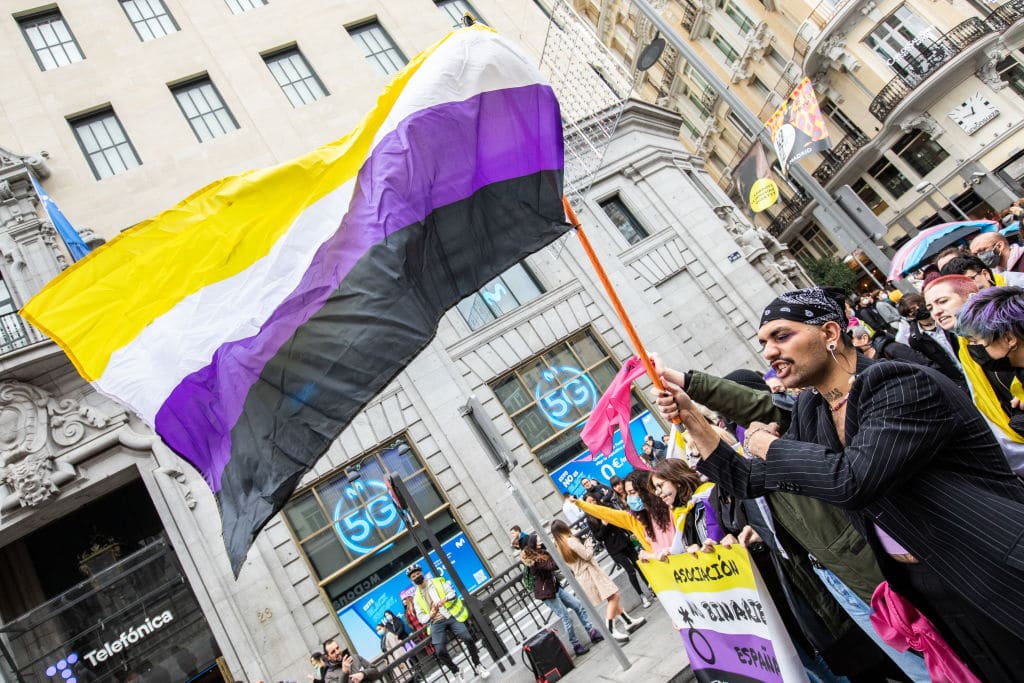Non-binary activist in Madrid, Spain, 2021. (Aldara Zarraoa/Getty Images)
The Tory government is being urged to clarify “the barriers” preventing non-binary recognition and to legislate on the issue before the next election by a cross-party group of MPs.
The demand for action comes from MPs in the cross-party Women and Equalities Select Committee, which has published the report of its investigation into the government’s “spectacular” failures regarding Gender Recognition Act (GRA) reform.
“A large volume of written evidence submitted to this inquiry has called for the legal recognition of non-binary people through the GRA, and expressed disappointment that the government did not bring forward changes to this in its proposals to reform the process,” the report says.
Non-binary people make up around half of the UK’s trans population, itself around half a million people, according to the government’s own tentative estimates.
However, there is no provision for non-binary identities under current gender recognition laws in the UK. Petitions garnering hundreds of thousands of signatures have demanded non-binary recognition, but the government’s response is always that it is “too complex“.
The committee, which is chaired by Tory MP Caroline Nokes, said the government should “clarify what the barriers are that prevent it from allowing non-binary people to be legally recognised” within the next three months.
Moreover, the Equality and Human Rights Commission (EHRC) should “undertake research in this area” so that proposals for non-binary legal recognition “can be brought forward during this parliament”. The current parliament is expected to be dissolved before a general election in 2024.
Abandoned research into non-binary legal recognition
During the government’s 2018 public consultation into reforming the GRA, it said it would “gather evidence to further advance equality for non-binary and intersex people”.
Nearly two-thirds (64.7 per cent) of people who responded to that consultation agreed that the GRA should be reformed to include non-binary people, but the government abandoned meaningful reform in favour of digitising the gender recognition process and reducing the fee to £5.
Also in 2018, in the LGBT Action Plan, the Tories committed to “launch a separate Calls for Evidence on the issues faced by non-binary and intersex people”, the report says – yet this was never carried out.
The equalities committee inquiry discovered, through a witness statement by a Government Equalities Office (GEO) official to a court case regarding ‘X’ gender markers on passports, that “the call for evidence will be run by the National Institute for Social Research, and the contractor was ready to commence work immediately after the general election which was due to take place on 12 December 2019”.
“This call for evidence has not been launched,” the committee says.
The Equality and Human Rights Commission (EHRC) told MPs during their GRA inquiry that it “recommended that further understanding was needed before any legislation was brought forward in that area [non-binary recognition]”.
However, Melanie Field, an executive director at the EHRC, told the inquiry that the EHRC was “not planning to do any research on that at the moment”.
The Women and Equalities Committee report also criticised the government for its wider handling of GRA reforms, and recommended that it move urgently to instigate meaningful reforms.
Its recommendations include: removing the requirement that trans people get a diagnosis of gender dysphoria before they can be legally recognised by 2023, launching an action plan in the next 12 weeks for reforming the GRA, removing the spousal veto from gender recognition laws, and scrapping the requirement that trans people live in their “acquired gender” for two years before they can seek legal recognition.
Commenting on the committee’s report, a Government Equality Hub spokesperson said: “The government believes the current provisions in the Gender Recognition Act are effective and allow for those who wish to legally change their gender to do so.
“We listened to those who responded to the GRA consultation and are taking steps to modernise the way that individuals can apply for a Gender Recognition Certificate as a result, including reducing the cost and moving the process online.”
